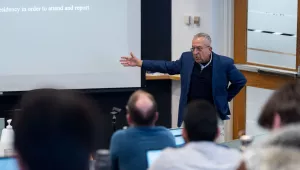Violence After Victory: Explaining Human Rights Outcomes After Conflict Termination
Speaker: Christopher Wiley Shay, Research Fellow, International Security Program
What stops human rights abuse? Christopher Shay explores this question in the context of conflict terminations, moments when leaders can plausibly turn away from repressive tactics. Many leaders fail to seize this opportunity, however, even in cases of democratization. Drawing on cross-national quantitative findings and qualitative research conducted in Nepal, Shay argues that these leaders' options are often constrained by powerful security institutions—and that civil-military relations are critical to understanding human rights outcomes.
Everyone is welcome to join us via Zoom! Register in advance for this meeting: https://harvard.zoom.us/meeting/register/tJYocuiqrjopGNTxGJiOOsiUiylmF52NRnC5




